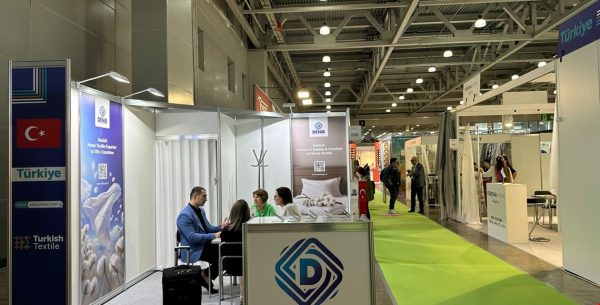According to figures released by the Turkish Exporters Assembly (TİM), Türkiye’s total exports rose by 3.2% in March to $23.4 billion. Denizli outperformed the national average, with exports increasing by 9.8% year-on-year to reach $417 million. Data from the Denizli Exporters Association (DENİB) showed recorded exports at $302 million, up 7.8%.
In the first quarter of 2025, Denizli’s total exports climbed 6.2% compared to the same period last year, totaling $1.13 billion. This performance aligns with the province’s yearend export goal of $4.7 billion. Notably, Denizli ranked 8th among Turkish provinces in terms of total exports in March.
Sectoral Highlights:
Mixed Results in Key Industries In March, sector-based performance was varied:
• Textile and apparel exports declined by 8% to $116 million,
• Electrical and electronics exports surged by 37% to $91 million,
• Iron and non-ferrous metals exports increased by 11% to $65 million,
• Agricultural exports grew by 4% to $32 million,
• Mining exports rose by 10% to $23 million.
Significant gains were also recorded in February in cereals, pulses, oilseeds and related products (up 51%), electrical-electronics (up 37%), and the automotive sector (up 35%).
UK and US Lead Destination Markets
The United Kingdom retained its top spot among Denizli’s export markets with a 17% increase, reaching $52 million. The United States followed with a 20% increase to $44 million, reclaiming second place. Italy came in third with a 25% rise to $35 million. Germany, which dropped to fourth place, saw a 7% decline to $30 million. Exports to the Netherlands increased by 11% to $21 million.

Economic Indicators Point to Caution
In its March meeting, the Central Bank of Türkiye (CBRT) cut the policy rate by 250 basis points from 45% to 42.5%, following a total of 500 basis points in cuts during the first quarter. The next monetary policy meeting is scheduled for April 17, with market expectations suggesting a pause in rate cuts. Manufacturing data showed signs of a slowdown. The headline Purchasing Managers’ Index (PMI) for March fell to 47.3 from 48.3 in February the lowest reading since October 2024. New orders declined for the 21st consecutive month, with export orders seeing their steepest drop since November 2022.
In the Eurozone, the manufacturing PMI stood at 48.7 in March still under the 50 threshold indicating contraction. In the U.S., the PMI dropped from 50.6 in February to 49.8 in March. These declines signal continued demand contraction, which is expected to affect Denizli’s export momentum in the coming months.
Inflation and Exchange Rate Dynamics
,According to the Turkish Statistical Institute (TÜİK), the Consumer Price Index (CPI) rose by 2.46% in March, bringing the annual rate to 38.1%. While inflation since the start of the year reached nearly 10%, the USD/TRY exchange rate rose by only 7%. The mismatch between inflation and exchange rate growth continues to pressure exporters. “Exporters don’t demand a high exchange rate, but a competitive one,” stated local trade officials. “Achieving balance between inflation and the exchange rate would provide a more favorable export environment.”
Trump’s Tariff Measures and Global Trade Outlook
New customs tariffs announced by U.S. President Donald Trump placed Türkiye in the lowest bracket at 10%. With a $28.5 billion trade volume, the U.S. is Türkiye’s second-largest export market, accounting for 6.5% of total exports.
Countries competing with Türkiye in textile exports such as China, India, South Korea, Italy, Pakistan, and Taiwan will face higher tariffs. This could give Turkish textiles a pricing advantage in the U.S. market.
The EUR/USD exchange rate has also risen to 1.10, which could further benefit Turkish exporters. However, the broader outlook remains uncertain.
Trump’s tariff hikes, especially the 20% additional customs duty on EU imports, could slow the European economy Türkiye’s biggest trade partner. Economic contraction in the EU would directly impact Turkish exports.
Moreover, such protectionist U.S. policies risk increasing global trade uncertainty, undermining investor confidence, and slowing worldwide economic growth. While China has pledged to take strong countermeasures, European Commission President Ursula von der Leyen has warned that the tariffs could significantly affect the global economy.







